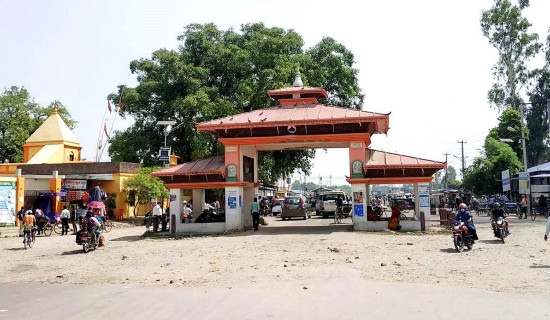- Thursday, 26 February 2026
Bar-Bench Row Taints Justice System
Judiciary in Nepal is not free from one or other kind of controversies. The tenure of the outgoing chief justice Biswambhar Prasad Shrestha was more or less a smooth sailing. However, the tussle between the Bar and the Bench over the nominations of justices for the Supreme Court (SC) which erupted around the end of his term rendered his exit not very graceful. It has exposed the deficiencies stalking the legitimacy of the judiciary. The Bar-Bench conflict peaked recently when contempt of court case was filed against the Nepal Bar Association (NBA) president who had criticised the process of the selection of justices for the vacant positions of the SC. The court administration had filed the case following the decision of the court’s full bench. However, the conflict has taken a positive twist as the contempt of court case filed against the Bar president has been withdrawn.
The conflict had indeed escalated when the Judicial Council had nominated two high court chief judges as Supreme Court justices while lawyers were staging sit-in on the council premises, protesting against the selection. The NBA president criticised the selection accusing that the council picked the judges for the Supreme Court in an unfair manner. Experts who have closely studied the Bar-Bench dispute say that the issue could have been sorted out without resorting to litigation as such actions on the part of judiciary degrade the trust and legitimacy of judiciary.
Inefficiency
The public confidence in the capacity of judicial institutions to deliver justice has been on the wane. Reports and statements of the Transparency International and International Commission of Jurists, among others, published time and again have indicted Nepal’s court system as being subject to pervasive corruption and executive influence, causing overall inefficiency in the process of justice dispensation. Not only this, the reports prepared by panels, headed by the sitting judges of the SC, have documented the several malaises and abusive practices wrecking the functional and institutional vitals of the judicial institutions in Nepal.
The reports have also suggested various measures to reclaim and restore the legitimacy of the court system. But the judicial leadership and state actors have been alleged to be reluctant to provide the much-needed attention and priority to implement the suggestions contained in the reports presented from time to time to restore the propriety in the judicial institution. An independent and impartial judiciary is the cornerstone of the rule of law and of a democratic state. It serves to protect human rights and people’s liberties, provides a democratic check on other branches of government.
Moreover, it helps to secure an environment conducive to economic growth and social progress. Therefore, when corruption and anomalous practices occur in the judiciary, it undermines the very principles of fairness and due process of law resulting into denial of people's right to justice. Public confidence is fostered when judicial outcomes are just and yielded without undue pressure or influence from outside. Justice actors have been blamed in Nepal for their blatant, unjust and unfair practices.
The indictment that the former chief justices especially Cholendra Shumsher Rana hobnobbed and bargained with the executive leadership of the government in spoils sharing became the flashpoint of the hostile confrontation in the judiciary that occurred more or less three years ago. The worst expression of legitimacy deficit of judicial leadership had peaked when all judicial colleagues and justices shunned Rana refusing to participate in hearing of the cases till he stepped down from his judicial leadership position. Likewise, lawyers and law practitioners had staged strike for long demanding the resignation of the incumbent chief justice who had been accused of bringing disrepute to the judicial institution in the country.
In fact, Nepal had opted for federal democratic polity institutionalised through the constitution written by the constituent assembly with a view to ensure legitimacy and effectiveness of the state institutions including judiciary. Needless to say, all the state institutions in the democratic polity are subject to democratic legitimacy test and requirements.
Faith
Max Weber puts forward a very influential account of legitimacy. According to Weber, the state institutions become legitimate only when people and other institutional participants repose their faith in it. The basis of system of authority, and correspondingly of every kind of willingness to obey is a belief and trust by virtue of which persons exercising authority are lent consent, prestige and support. Consent is, therefore, a necessary condition for the legitimacy of political authority. The test of the consent is grounded on the integrity, utility and performance of the state institutions, including executive, legislative and judiciary. Moreover, legitimacy is fostered and strengthened by affirmation of rule of law, respect for human rights and justice, accountability and integrity.
The legitimacy deficit stalking the state institutions, especially judiciary, has been thus due to, among others, disrespect and non-adherence of moral values and integrity on the part of justice actors in the judicial institutions. Unless the issues surrounding moral and ethical grounds for legitimacy among justice actors in the system of justice delivery are functionally and structurally addressed, the crisis will not be fully tackled. Only patchwork and piecemeal changes will not be adequate.
The incumbent Chief Justice Prakash Raut is expected to work towards this end. Not only judges but also other justice actors including lawyers should be ready to undergo ethical and legitimate transformation to boost the image and profile of judiciary. The NBA should also do some kind of soul-searching to ensure that lawyers and advocates cooperate each other to enhance legitimacy of the judicial institutions.
(The author is presently associated with Policy Research Institute (PRI) as a senior research fellow. rijalmukti@gmail.com)
















